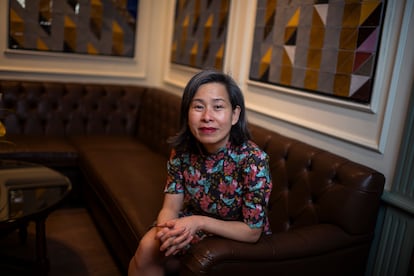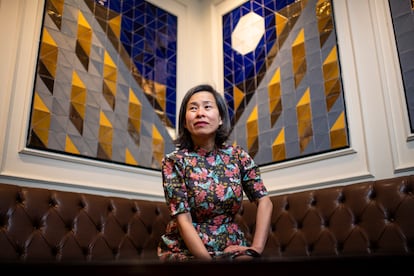Author Kim Thúy: ‘Canada is more communist than Vietnam’
Her successful novel ‘Ru’ has been adapted into a film by Charles-Olivier Michaud; like much of her work, it deals with the aftermath of war and the vicissitudes of migration


Kim Thúy appears in a colorful flowered dress and her smile lights up the room. She says she was wrong to eat churros at midnight: she didn’t sleep well after that. Born in Saigon 55 years ago, the writer was one of the boat people, the Vietnamese from the losing side of the war who left the country by sea to escape the Communist victors. She survived the crossing, arrived in a refugee camp in Malaysia and then Canada opened its doors to her; she settled in Quebec. Her novelistic work is based on short poetic vignettes and deals with the memory of the war as well as the process of integration as a migrant in a distant new country. She is in Madrid to present the film based on her successful novel Ru, directed by Charles-Olivier Michaud; it was screened this Thursday at the IX Muestra de Cine Francófono [the IX Francophone Film Festival].
Question. In your books, you say that Vietnamese people are very reserved, but you seem very expressive.
Answer. But I am Canadian, and not only that but from Quebec…The rest of Canada, English Canada, is more influenced by the Anglo-Saxon culture, so they’re more reserved. But Quebecers are from the French part, and they are more expressive. But it is true that they are not as expressive as I am. I think I have become a caricature. It’s a learned culture. I wanted to be a Quebecer. I tried so hard, and I went too far. Now, I am more than a Quebecer. And also, I think [it’s from] when we got off the boat.
Q. What happened on the boat?
A. We got off the boat [from Malaysia] and 15 minutes later, a rain came down and the boat broke in front of our eyes, just like that. 15 minutes more, and I wouldn’t be here. So, after that everything is joyful, it’s a bonus. Every day is a bonus day, it’s a gift. And I think that’s why happiness has become a responsibility for me.
Q. Why did you flee Vietnam?
A. We were from the south, and in 1975, the north won. There’s persecution because you have to take away all the power from those who were there before you. It’s not like an election [where] you just change people. Here, you change ideology…and we were from the losing side…All the boys who were not admitted to university were sent [to] the battlefield. There were two battlefields one in Cambodia and one at the border with China. My uncle was 17, and I have two brothers. We knew all the boys would die…We were from the losing side, so for sure we were going to die. And we were also sure that we were going to die at sea.
Q. There wasn’t much choice.
A. At least at sea it was your final attempt. You have—maybe—a chance. But we already accepted that we were going to die. And so that’s why my father brought with him cyanide pills. We die because of the sea, or because of pirates, or sometimes there were boats that went right back to Vietnam, because of the currents, because of the wind, and we didn’t know where we were going. So, yeah, there were no choices for us.
Q. So, the worst thing for you was not the war, but the end of the war.
A. Absolutely. We tend to forget to explain that peace doesn’t come. Peace is something that you need to build and you need to work on. Even when the war ends, if we don’t build peace we will never have it… Peace is something that we need to wish for and to work for. I’m very proud of Canada. I think for 200 years no blood has been spilled in this country because of conflict. This is something that Canada has chosen. It’s a conscious choice, a societal choice to not have war.

Q. In Spain, we had the Civil War 80 years ago. But it still influences the present. It is hard to forget. You are still writing about the Vietnam War.
A. Inside Vietnam, we talk about the war, but from only one side of the story, from the winning side, not from the losing side. That’s why the boat people’s story is not found anywhere in Vietnam in any history books. And the boat people’s story will die as soon as my parents die or as soon as I die. You need a historian, you need someone with dates [to write about it]. I am just a witness. In Vietnam, it is not called the Vietnam War, it is called the American war. And everybody is right. We need someone to gather all the voices, to bring out not the truth, because there is no one truth, but many truths.
Q. When we think of the Vietnam War we usually think of Vietnamese versus Americans, but there were also Vietnamese on the losing side.
A. That’s a problem. We were just [in the wrong place] at the wrong time as a country. Because the North was supported by the Chinese, or, at different times, by the Soviets….Vietnam was basically supported by these big countries…And in the South, [it was] the same thing with the Americans. [Neither side had] the means to fight for 20 years. And maybe they [had] the means to fight, but not the extraordinary means that killed so many people in such a fatal way. Maybe we would fight with only knives and fists.
Q. We have terrible conflicts now, Ukraine, Gaza... Why are we still fighting like this?
A. We repeat history. I never thought that the word “boat people” would be used again. And today we are. I think it’s because of human nature. We have this darker side to us, not because we want to fight, but because some people want to fight and they take us, the population, as hostages.
Q. What can we do?
A. I think we have to teach children from a very early age that we have a dark side, not kindness and empathy but teaching that you can feel that you want to be cruel, that you can feel anger, that you can feel jealous, and that can push us to do terrible things…Then you can learn new tools for how to stop. But now we don’t say that. We never say that.
A mother who has lost a son or a daughter to war feels the same pain. It doesn’t matter if the soldier was from the north or south, east or west. When you lose a loved one, you lose a loved one. There’s no more politics.”
Q. In some of your books you tell the small stories about war that affect people; perhaps the horror of war is better understood that way.
A. You realize that a mother is just a mother. A mother who has lost a son or a daughter to war feels the same pain. It doesn’t matter if the soldier was from the north or south, east or west. When you lose a loved one, you lose a loved one. There’s no more politics. We forget to talk about them as only humans. But we will use them as [political] instruments.
Q. What is politics for?
A. In my mind, it should be guidance, a vision for a country. What do we want as a society? Do we want a society that wishes to have peace, to be generous, to take care of each other? What kind of policies do we want, and from there we make decisions. And, you know, when we talk about communism, I think Canada is more communist than Vietnam. Because communism is about taking care of everyone, and everybody should be equal. We pay so much in taxes that everyone, poor or rich, has to go through the same health system, you don’t have a choice. In Vietnam, if you have money, you have access. If you know the right people, you have access.
Q. Some people say that the welfare state is the best form of communism. Others hate it precisely for that reason.
A. Completely. In Canada, anyone can go to university if you really want to. In Canada, you want to try? Try, we’ll help you…We have a very sophisticated law on bankruptcy. What does that mean? The government is telling you “try, try,” and if you fall the law is here to help you fall, to attenuate your fall, so you don’t hurt yourself too much. And the law is also there to [help you] stand back up to try again…It’s a country that supports their people to be daring, to try, to dream. You read this [law] and you understand what this country stands for.
I bet you [that] any person who hates immigrants, if they have a chance to just sit down and hear one story, then it is just one human to another human.”
Q. Far-right nationalist sentiment is growing against migration.
A. Immigration has become a political instrument to divide the population. To talk about the economy to divide the population is too long, too hard to explain. So you just say “be aware of strangers.” We’ve learned from a young age “don’t talk to strangers. Beware of strangers.” So when you use strangers, foreigners, you’re mind goes to, “oh, that’s dangerous.” So, politics, again. Before it was communism [being used] to scare people. Today, nobody cares about communism. It doesn’t work anymore. So, now, something that would scare someone right away? Immigration. But that’s what makes me so mad. In real life, in everyday life, it doesn’t work like that.
Q. What is it like in real life?
A. In real life, people still love each other. That’s why it is so important to tell the little stories. In our mind, we cannot connect with a convoy of immigrants, we cannot connect with a camp of refugees, we can connect with one person at a time, one story at a time. And I bet you [that] any person who hates immigrants, if they have a chance to just sit down and hear one story, then it is just one human to another human. And they will change [their mind] completely because you cannot label. Immigration should be connected with the word investment. [It is] investment in a person and the return on the investment is usually great. It’s there in one generation. And in Canada, we don’t have enough people. How many Canadians have never met an immigrant? I would bet you zero. Because Canadians are immigrants themselves, you know, it’s a very young country. Most Quebecers know the city of their great, great-grandparents.
Sign up for our weekly newsletter to get more English-language news coverage from EL PAÍS USA Edition
Tu suscripción se está usando en otro dispositivo
¿Quieres añadir otro usuario a tu suscripción?
Si continúas leyendo en este dispositivo, no se podrá leer en el otro.
FlechaTu suscripción se está usando en otro dispositivo y solo puedes acceder a EL PAÍS desde un dispositivo a la vez.
Si quieres compartir tu cuenta, cambia tu suscripción a la modalidad Premium, así podrás añadir otro usuario. Cada uno accederá con su propia cuenta de email, lo que os permitirá personalizar vuestra experiencia en EL PAÍS.
¿Tienes una suscripción de empresa? Accede aquí para contratar más cuentas.
En el caso de no saber quién está usando tu cuenta, te recomendamos cambiar tu contraseña aquí.
Si decides continuar compartiendo tu cuenta, este mensaje se mostrará en tu dispositivo y en el de la otra persona que está usando tu cuenta de forma indefinida, afectando a tu experiencia de lectura. Puedes consultar aquí los términos y condiciones de la suscripción digital.








































